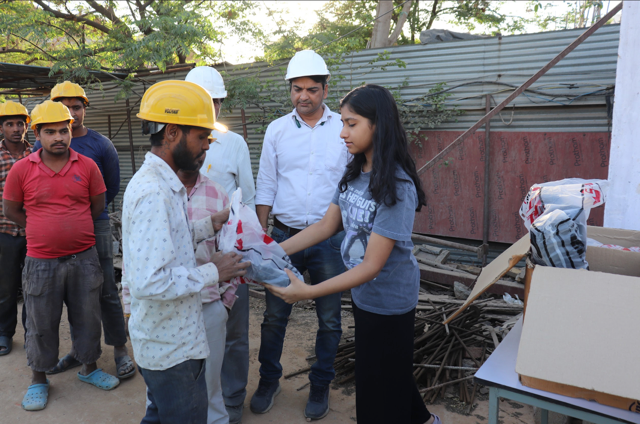At an age when most teenagers are focused on schoolwork and social media, Ritvi Jain, a Grade 10 student at Modern School Vasant Vihar, has set her sights on something far more ambitious — solving one of India’s most persistent environmental and social problems. Through her initiative SansaarSite, Ritvi is challenging how construction waste is managed and how worker safety is prioritized on building sites.
Her flagship project, Suraksha Soles, is a remarkable example of how youthful vision, sustainability, and social responsibility can intersect to create meaningful change. It converts discarded PVC debris from construction sites into durable, low-cost safety footwear for construction workers — protecting both people and the planet.
The inspiration came from something Ritvi witnessed close to home. It was an idea born from observation. Growing up around construction sites, she saw heaps of PVC waste — pipes, cables, flooring material — being dumped or burned, and noticed labourers often working without proper safety shoes. The contrast between waste piling up and workers going unprotected struck her deeply. “It seemed wrong that one problem couldn’t help solve the other,” she reflected.
India’s construction industry produces 10 to 15 million tonnes of garbage annually, a large share of which is plastic, mainly PVC. With more than 71 million workers employed in the sector — and nearly 60 percent lacking proper safety gear — the scale of the challenge is enormous. Employers typically spend ₹1,500 to ₹5,000 per worker each year on safety equipment, and a substantial portion goes toward footwear. The result: limited budgets, poor-quality shoes, and, too often, workers left unprotected.
To address this, Ritvi founded SansaarSite, a sustainability-focused platform dedicated to reducing construction-site waste through upcycling and recycling. Its first project, Suraksha Soles, takes a circular-economy approach by transforming discarded PVC into affordable steel-toe gumboots.
In collaboration with Lancer Shoes, Ritvi designed a production system where waste is collected from construction sites, sorted, cleaned, and shredded into granules, which are then processed into PVC pellets. These pellets become the base material for manufacturing new boots. Each pair is tested for strength, durability, and water resistance before being distributed back to construction workers — often at nearly half the market price.
What sets Suraksha Soles apart is its closed-loop model. Once the boots reach the end of their lifespan (usually six to twelve months), they are returned to the factory for refurbishment. The steel toe caps are removed and reused, while the PVC material is recycled and blended with 20 percent fresh PVC to maintain quality. The renewed boots are then redistributed, ensuring the cycle continues without adding to landfill waste.
Ritvi’s first pilot project, conducted at a construction site in Sector 57, Gurgaon, yielded impressive results: 97 pairs of recycled gumboots produced, 120 kilograms of PVC waste reused, and each pair costing only Rs. 570 to make. The pilot not only proved the project’s feasibility but also demonstrated how environmental sustainability and worker welfare could go hand in hand.
The environmental benefits are tangible — less PVC burned or buried, fewer microplastics released, and reduced greenhouse-gas emissions from virgin plastic production. Economically, employers save money while labourers gain access to sturdy, protective footwear. The initiative also supports local employment, generating work in waste collection, sorting, and manufacturing.
So far, Suraksha Soles has partnered with two construction sites, and Ritvi aims to expand to four more by the end of the year. Each new collaboration helps multiply both the environmental and social benefits of her vision.
What makes Ritvi’s story truly inspiring is her age. Balancing school studies with site visits, partnerships, and production coordination is no small feat. Yet she manages it with a calm determination that belies her years. Her teachers describe her as “deeply curious and relentlessly driven,” while collaborators admire her professionalism and sense of purpose.
Through SansaarSite, Ritvi hopes to push India’s construction sector toward responsible growth — where sustainability becomes a standard practice rather than an afterthought. Her work on Suraksha Soles has already started conversations about how youth-led innovation can drive corporate and community change.
As she puts it, “Every step taken in a pair of Suraksha Soles is a step toward sustainability.”
In an era where climate anxiety often overshadows climate action, Ritvi Jain stands out as a young changemaker proving that age is no barrier to impact. Her project doesn’t just recycle plastic — it reshapes mindsets, showing that with creativity, courage, and compassion, even a student can make the world’s biggest industries walk a little lighter on the planet.

